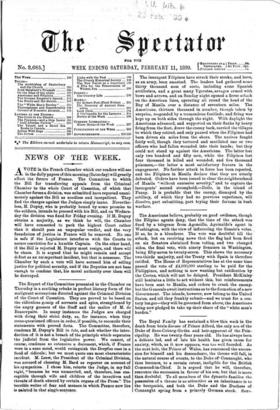The Report of the Committee presented to the Chamber on
Thursday is a scathing rebuke in perfect literary form of the malignant accusations directed against the Criminal Division of the Court of Caseation. They are proved to be based on the ridiculous gossip of servants and spies, strengthened by the angry guesses of the Staff and the malice of M. de Beaurepaire. In many instances the Judges are charged with doing their strict duty, as, for instance, when they cross-questioned officers in order, if possible, to reconcile their statements with proved facts. The Committee, therefore, condemn M. Dupny's Bill in tote, and ask whether the intro- duction of it is not a breach of the principle which separates the judicial from the legislative power. We cannot, of course, condense so extensive a document, which, if France were in a sane mood, would extinguish the Dreyfus case in a flood of ridicule; but we must quote one most characteristic incident. M. Loew, the President of the Criminal Division, was accused of choosing M. Bard as reporter on account of his sympathies. I chose him, retorts the Judge, in my full right, "because he was unmarried, and, therefore, less sus- ceptible through wife and children of the invectives and threata of death uttered by certain organs of the Press.". The horrible welter of fear and menaca in which France now lies is painted in that single sentence.






































